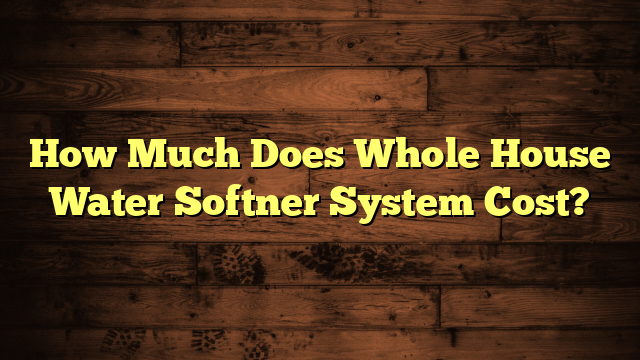How Much Does Whole House Water Softner System Cost?
When you consider that a neighbor recently spent around $3,000 on a whole house water softener system, you might be wondering how much you'd need to budget for similar benefits. The cost can vary greatly based on factors like water hardness and your household's specific needs. Understanding the nuances of equipment prices, installation, and ongoing maintenance is essential for making an informed decision. What you find out could surprise you and potentially save you money in the long run.
Key Takeaways
- The total investment for a whole house water softener system typically ranges from $1,300 to $4,200, including equipment and installation costs.
- Equipment costs alone can vary from $1,000 to $3,000 based on the type and quality of the system.
- Installation costs can range from $300 to $1,200, depending on complexity and local labor rates.
- Ongoing maintenance, including salt refills and filter replacements, should be budgeted for additional recurring expenses.
- System efficiency and household needs can significantly influence overall costs, especially for larger homes with higher water usage.
Factors Influencing Cost
What really affects the cost of a whole house water softener system? One major factor is water hardness. If your water's hardness level is high, you'll likely need a more robust system to effectively combat the mineral buildup. This can drive up both initial costs and ongoing maintenance expenses.
Another critical aspect is system efficiency. More efficient systems not only soften water more effectively but also use less salt and water in the process. This means you'll spend less on salt replenishment and water waste over time, ultimately saving you money in the long run.
When you consider these factors, it's important to assess your household's specific needs. For instance, larger homes with higher water usage may require a more powerful unit, adding to the overall cost.
Don't forget about installation costs, as professional setup can vary greatly based on your location and the complexity of the installation.
Types of Water Softener Systems
When choosing a whole house water softener system, you'll encounter several types, each designed to meet different needs and preferences.
Salt-based systems are the most common, utilizing ion exchange to remove hard minerals from your water. They tend to be effective but require regular maintenance, including salt replenishment.
If you're looking for something less traditional, magnetic softeners and electronic descalers provide eco-friendly options that claim to alter mineral behavior without chemicals.
Dual tank units offer continuous soft water by using two tanks that alternate during regeneration, which is ideal for larger households.
For those who need mobility, portable softeners can be a great choice, allowing you to soften water on the go, especially useful for RVs or camping.
If you're also concerned about drinking water quality, consider a reverse osmosis system, which can be integrated with your water softener for even cleaner results.
Each type has its pros and cons, so evaluating your specific needs will help you determine which water softener system is the right fit for your home.
Average Cost Breakdown
When considering a whole house water softener system, it's crucial to understand the average cost breakdown.
You'll need to factor in equipment and installation costs, as well as ongoing maintenance and operation expenses.
Furthermore, if you're eyeing extra features, knowing their pricing can help you make a more informed decision.
Equipment and Installation Costs
Investing in a whole house water softener system typically involves two main components: equipment and installation costs. The price of the equipment can range considerably, depending on the quality you choose. High-quality systems may cost anywhere from $1,000 to $3,000 or more. Features like digital controls, advanced filtration, and higher capacity can increase the price, but they often provide better performance and longevity.
When it comes to installation, the complexity of the job plays a vital role in determining costs. Simple installations may cost between $300 and $600, while more complex setups, which may involve plumbing adjustments or electrical work, can range from $600 to $1,200.
It's important to factor in both equipment quality and installation complexity when budgeting for your water softener system.
In total, you might be looking at a combined cost of $1,300 to $4,200. To guarantee you're making a smart investment, consider obtaining multiple quotes from installers and researching various water softener brands. This way, you can find a system that meets your needs without breaking the bank.
Maintenance and Operation Expenses
A whole house water softener system not only involves upfront costs but also ongoing maintenance and operation expenses.
You'll want to budget for these costs to guarantee your system runs smoothly and efficiently.
Here's a breakdown of what you can expect:
- Routine checks: Regular inspections help catch issues early.
- Salt refills: Depending on your system and water hardness, you'll need to replenish salt every few months.
- Filter replacements: These typically need changing every 6 to 12 months, depending on usage.
- Professional servicing: Scheduling an annual service can help maintain peak performance.
- Water usage costs: Softened water can slightly increase your water bill, so factor that in.
Additional Features Pricing
While maintaining your whole house water softener system is important, you may also want to contemplate additional features that can enhance its performance or convenience. Investing in these premium features can provide you with better water quality and efficiency. Here's a breakdown of some common additional features and their average costs:
| Feature | Average Cost ($) |
|---|---|
| Advanced Filtration | 300 – 600 |
| Smart Technology | 500 – 1,200 |
| Salt-Free Alternatives | 1,000 – 2,500 |
| Pre-Filter Systems | 200 – 400 |
| Extended Warranty Options | 100 – 400 |
These features, while adding to your initial investment, can save you money over time by improving the system's effectiveness and reducing future repairs. Warranty options are also worth considering; they can provide peace of mind and financial protection against unexpected issues. Ultimately, weighing your needs and budget will help you decide which additional features are worth it for your whole house water softener system.
Installation Costs
Typically, installation costs for a whole house water softener system can vary notably based on several factors. You'll find that the installation process can influence the total expense considerably. For instance, the complexity of your plumbing, the type of system you choose, and local labor rates all play a role.
Here are some key factors that affect installation costs:
- Type of Water Softener: Different systems have varying installation requirements.
- Plumbing Modifications: Additional plumbing work may increase costs.
- Labor Rates: Local professionals might charge more or less depending on your area.
- Permits and Regulations: Some areas might require permits, adding to the expense.
- Installation Timeline: A more extended timeline can lead to higher labor costs.
On average, you might expect to spend between $500 and $2,500 for installation, depending on these factors.
It's wise to get multiple quotes to guarantee you get a fair price. Don't forget to ask about warranties and follow-up services while discussing your installation timeline.
With the right planning, you can enjoy the benefits of softened water without breaking the bank.
Maintenance Expenses
Once your whole house water softener system is installed, you'll want to contemplate the ongoing maintenance expenses that come with it. Regular maintenance is essential to keep your system running efficiently.
One of the primary expenses you'll encounter is salt delivery, which is necessary for the ion-exchange process that softens your water. Depending on your water usage and hardness levels, you may need to order salt every few months.
Additionally, you'll need to think about filter replacement. Many systems require filter changes every six months to a year, depending on usage and water quality. These filters help keep your water clean and free of impurities, guaranteeing your softener works effectively.
The cost of salt and filters can add up over time, so it's wise to budget for these recurring expenses.
Moreover, consider scheduling routine maintenance checks by a professional. While this might feel like an extra expense, it can help identify any potential issues early and prolong the life of your system.
Long-term Savings
Investing in a whole house water softener system can lead to significant long-term savings that often outweigh the initial costs. While the upfront expense might seem high, the long-term benefits for your home, appliances, and health can be remarkable.
With improved water quality, you'll notice that your plumbing, water heater, and appliances last longer, saving you money on repairs and replacements.
Consider these savings:
- Reduced energy bills: Softer water requires less energy to heat, which can lower your utility costs.
- Longevity of appliances: Water softeners prevent scale buildup, extending the lifespan of your dishwasher, washing machine, and water heater.
- Fewer cleaning products: You'll use fewer soaps and detergents because soft water cleans more effectively.
- Reduced plumbing issues: Softer water decreases the chances of clogs and corrosion in your pipes.
- Health benefits: Improved water quality can lead to healthier skin and hair, potentially reducing dermatological expenses.
In the long run, a whole house water softener system is an investment that pays off by enhancing your home's efficiency and promoting better health for you and your family.
DIY vs. Professional Installation
Choosing between DIY and professional installation for your whole house water softener system can greatly impact your experience and the system's performance.
If you're handy and enjoy tackling home improvement projects, you might consider the DIY route. DIY benefits include saving money on labor costs, having complete control over the installation process, and the satisfaction that comes from completing the job yourself. You can take your time, guaranteeing everything is done according to your standards.
However, there are professional drawbacks to going the DIY route. Without proper knowledge, you risk making mistakes that could lead to costly repairs down the line.
Professional installation can provide peace of mind, as certified technicians have the experience and expertise to guarantee everything is set up correctly. They can also identify any potential issues that you might overlook.
On the flip side, hiring professionals can be more expensive and might require scheduling that doesn't fit your timeline.
Ultimately, the decision boils down to your comfort level with home improvement tasks and your budget.
Weighing the pros and cons of each option is essential to making an informed choice that suits your needs.
Financing Options Available
When considering a whole house water softener system, exploring financing options can make the investment more manageable. Many homeowners find that financing plans can ease the financial burden, allowing you to enjoy the benefits of softened water without a hefty upfront payment.
Here are some common payment options you might encounter:
- Installment loans: Spread the cost over several months or years.
- Credit cards: Use existing credit to finance your purchase, but be cautious about interest rates.
- Home equity loans: Leverage your home's equity for a potentially lower interest rate.
- Manufacturer financing: Some companies offer their own financing plans with promotional rates.
- Personal loans: Consider unsecured personal loans that can provide the needed funds.
Frequently Asked Questions
How Do I Know if I Need a Water Softener?
To know if you need a water softener, check for signs of water hardness. Indicators include scale buildup on fixtures, dry skin, and soap not lathering well. If you notice these, consider a softener.
Can Water Softeners Improve Water Taste?
Did you know that 85% of homes have hard water? A water softener can enhance your water taste by improving mineral balance, reducing unpleasant flavors from hard minerals, and giving you cleaner, fresher drinking water.
What Is the Lifespan of a Water Softener?
A water softener typically lasts 10 to 15 years, depending on water softener maintenance. Watch for replacement indicators like reduced efficiency or salty taste, signaling it's time to evaluate a new unit for ideal performance.
Are There Eco-Friendly Water Softener Options Available?
You might think eco-friendly options are rare, but sustainable systems are actually quite common. Many brands offer water softeners that use salt-free technology or biodegradable materials, making it easier for you to go green at home.
Will a Water Softener Affect My Plumbing System?
Yes, a water softener can affect your plumbing system. It helps improve water quality, reducing scale buildup and extending the life of your pipes. Regular plumbing maintenance becomes simpler, leading to fewer costly repairs down the line.
Conclusion
To summarize, investing in a whole house water softener system can greatly improve your water quality and save you money in the long run. For example, a family in a hard water area saw their energy bills drop by 20% after installing a system, thanks to reduced scale buildup in their appliances. By carefully considering your options and costs, you can choose the right system tailored to your needs, ensuring cleaner water for your home and family.







